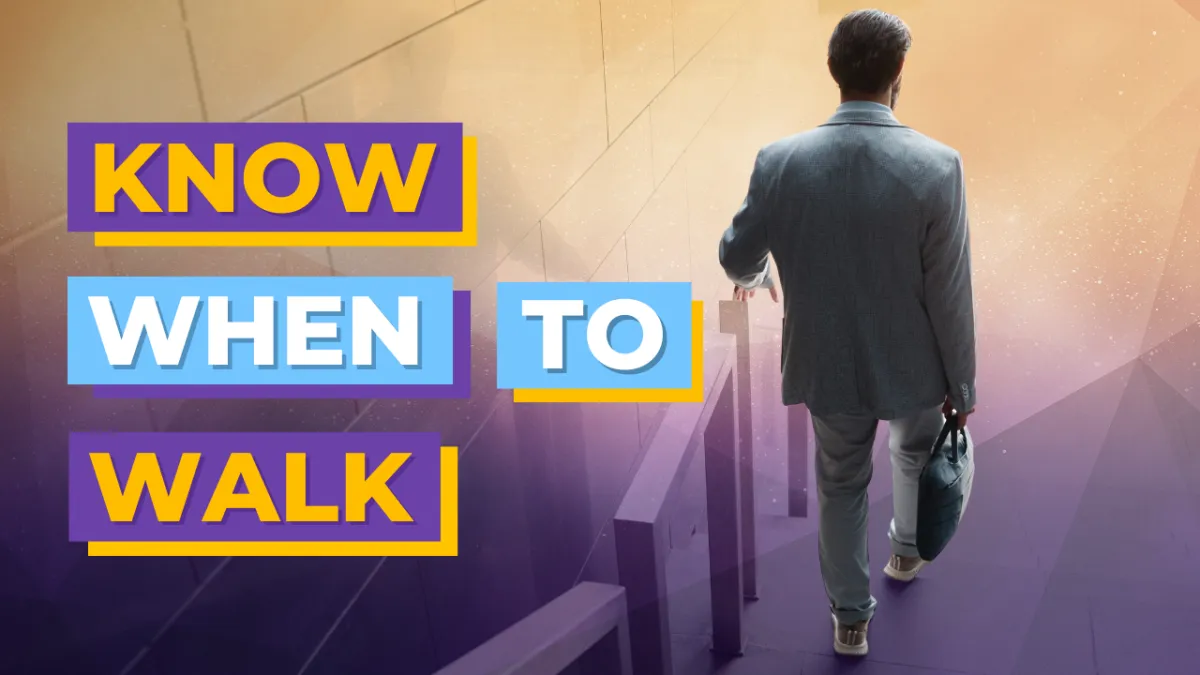
When to Walk Away from a Sales Deal: Why High-Status Sellers Qualify Buyers, Not Just Opportunities
"The best salespeople don’t chase — they choose.
They know that walking away from the wrong deal is how you make room for the right one."- Dan Rochon
Salespeople are trained to chase deals. But the best sellers — the ones with consistent, predictable income — know when not to chase.
They qualify buyers, not just opportunities. They understand that not every prospect deserves your time, trust, or energy.
The mindset that separates amateurs from pros isn’t about how many deals you close — it’s how many bad ones you walk away from.
The Hidden Cost of Chasing Every Deal
Every minute you spend convincing an unqualified buyer is a minute stolen from a serious one.
Tom Manning of Pathway Academy said it best:
“Teach your salespeople to disqualify prospects rather than assume everyone deserves help.”
Sales isn’t about pleasing people. It’s about leading them.
When you stop trying to “win every deal,” you free yourself to focus on qualified, deserving buyers — people who are serious, ready, and capable.
The $580K Lesson in Walking Away
Gal Aga, CEO of Aligned, once spent months pursuing a $580,000 deal. After countless proof-of-concepts, last-minute demands, and new stakeholders, he saw the truth:
The buyer wasn’t buying. They were exploiting his team’s effort.
When the COO tried to add an “opt-out” clause and demand discounts at the finish line, Gal did the unthinkable — he walked away.
He calls it “the best loss of his career.”
That’s the moment every high-status salesperson must master — the moment you choose self-respect over desperation.
Five Signs It’s Time to Walk Away
If you’ve ever wondered, “Am I wasting my time?”, here’s your answer.
These five red flags scream: stop, step back, and protect your energy.
Endless Movement, No Momentum
If your deal is filled with demos, calls, and revisions — but no commitment — it’s not progress. It’s procrastination.Late-Stage Surprises
New “decision-makers” suddenly appear, asking for discounts or opt-outs. Real buyers don’t move goalposts.Disrespect for Time
Reschedules, ghosting, or “let’s circle back” are signals of low urgency — or low respect.One-Sided Concessions
If they’re still negotiating after you’ve already agreed, they’re testing your boundaries.No Champion
If your contact disappears when it’s time to sign, you were never really in the deal.
The Stoic Sales Mindset
Marcus Aurelius wrote:
“You have power over your mind — not outside events.”
In sales, that means this: You can’t control how prospects behave, but you can control what you tolerate.
Prospects may lie, ghost, or delay. Your job isn’t to fix them — it’s to discern faster and move on sooner.
Benjamin Dennehy puts it bluntly:
“A prospect can’t fail at being a prospect. You fail by expecting them to act like you.”
Detach from Emotion — Attach to Process
The best defense against bad deals is a strong pipeline.
When you have five other conversations lined up, walking away feels powerful — not painful.
That’s why consistent lead generation isn’t just a habit; it’s your insurance policy against desperation.
Pipeline creates posture. And posture is what makes buyers respect you.
How to Lead Like a High-Status Seller
Here’s how top sales professionals maintain control without losing empathy:
Ask Hard Questions Early – “Why now?” “Who decides?” “What’s stopping you?”
Set Boundaries – “Before we proceed, I’ll need a signed agreement or deposit.”
Don’t Send Free Proposals – Free work kills authority.
Qualify for Partnership – Are they aligned, respectful, and decisive?
Detach Emotionally – No response in 72 hours? Move on.
Focus on the Pipeline – Momentum cures rejection.
Balanced Generosity: Serve Without Selling Yourself Short
Too much kindness in sales becomes self-sacrifice.
Real generosity is serving others without losing yourself.
Stoicism calls this “balanced virtue.” It’s the art of helping others while protecting your peace.
You don’t owe every prospect your expertise.
You owe yourself boundaries, confidence, and the discipline to walk when respect disappears.
Final Thought
Sales success isn’t about chasing — it’s about choosing.
Choose respect over desperation.
Choose qualified over convenient.
Choose to walk away when the deal costs your dignity.
Because sometimes, the most powerful close…
is the one where you close the door.
